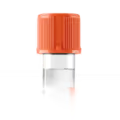Do I need a Thyroglobulin antibody test?
Struggling with unexplained fatigue, weight changes, or brain fog despite normal thyroid tests? Could thyroid antibodies be quietly interfering with your thyroid function?
Thyroglobulin antibodies reveal whether your immune system is attacking your thyroid tissue, which can disrupt hormone production even when standard thyroid tests appear normal. These antibodies often signal autoimmune thyroid conditions like Hashimoto's disease.
**Testing your thyroglobulin antibodies** gives you a vital snapshot of your immune system's impact on thyroid health, helping explain persistent symptoms and allowing you to personalize your treatment approach, dietary choices, and lifestyle strategies to address the root cause of your fatigue and metabolic struggles.
Method: FDA-cleared clinical laboratory assay performed in CLIA-certified, CAP-accredited laboratories. Used to aid clinician-directed evaluation and monitoring. Not a stand-alone diagnosis.

A derived biomarker is a value that is calculated from other directly measured biomarkers rather than being measured directly in the lab.
Get tested with Superpower
**If you’ve been postponing blood testing for years or feel frustrated by doctor appointments and limited lab panels, you are not alone.** Standard healthcare is often reactive, focusing on testing only after symptoms appear or leaving patients in the dark.
Superpower flips that approach. We give you full insight into your body with over **100 biomarkers**, personalized action plans, long-term tracking, and answers to your questions, so you can stay ahead of any health issues.
With physician-reviewed results, CLIA-certified labs, and the option for at-home blood draws, Superpower is designed for people who want clarity, convenience, and real accountability - all in one place.
Key benefits of Thyroglobulin antibody testing
- Detects autoimmune thyroid disease that may interfere with thyroid function monitoring.
- Flags Hashimoto's thyroiditis, a common cause of underactive thyroid and fatigue.
- Explains why thyroglobulin tumor marker results may be inaccurate in thyroid cancer surveillance.
- Guides treatment decisions when thyroid nodules or goiter are present.
- Tracks autoimmune activity over time to assess disease progression or remission.
- Clarifies unexplained symptoms like weight changes, brain fog, or low energy.
- Best interpreted alongside TSH, free T4, and thyroid peroxidase antibody results.
What is Thyroglobulin antibody?
Thyroglobulin antibody (anti-Tg or TgAb) is an immune protein produced by your body's defense system that mistakenly targets thyroglobulin, a large protein made exclusively by thyroid cells. Thyroglobulin itself serves as the raw material for thyroid hormone production inside the thyroid gland. When your immune system produces antibodies against it, this signals an autoimmune response directed at your own thyroid tissue.
Your immune system turning on the thyroid
These antibodies appear when the immune system identifies thyroglobulin as foreign rather than self. This autoimmune reaction is most commonly seen in conditions like Hashimoto's thyroiditis and Graves' disease, where the body attacks its own thyroid gland.
A marker of thyroid autoimmunity
The presence of thyroglobulin antibodies reflects ongoing immune activity against the thyroid. They can interfere with thyroid function over time and are also important in monitoring certain thyroid cancers, where they may affect the accuracy of thyroglobulin measurements used for surveillance. Their detection helps identify autoimmune thyroid disease and guide clinical management.
Why is Thyroglobulin antibody important?
Thyroglobulin antibodies reveal whether your immune system is mistakenly attacking thyroglobulin, a protein made exclusively by thyroid cells. When present, these antibodies signal autoimmune thyroid disease, most commonly Hashimoto's thyroiditis, and can interfere with thyroid function over time. They also complicate the monitoring of thyroid cancer, since thyroglobulin is used as a tumor marker after treatment.
When antibodies stay quiet
In healthy individuals, thyroglobulin antibody levels remain undetectable or very low, reflecting immune tolerance to the thyroid. This is the optimal state. It means the thyroid operates without autoimmune interference, and thyroglobulin measurements remain reliable for cancer surveillance if needed.
When the immune system turns inward
Elevated thyroglobulin antibodies indicate that the immune system is targeting thyroid tissue. This is the hallmark of Hashimoto's thyroiditis, which gradually destroys thyroid cells and can lead to hypothyroidism. Symptoms may include fatigue, weight gain, cold sensitivity, and brain fog as thyroid hormone production declines. Women, especially during reproductive years and after pregnancy, are far more likely to develop these antibodies than men.
The long view on thyroid immunity
Thyroglobulin antibodies don't just mark current inflammation - they predict future thyroid dysfunction and complicate cancer follow-up by rendering thyroglobulin tests unreliable. Monitoring these antibodies helps clinicians anticipate progression to overt hypothyroidism and adjust surveillance strategies, protecting metabolic, cardiovascular, and cognitive health over decades.
What do my Thyroglobulin antibody results mean?
Low or undetectable thyroglobulin antibody levels
Low values usually reflect the absence of an autoimmune response against thyroglobulin, the protein scaffold used by the thyroid gland to make thyroid hormone. This is the expected state in most healthy individuals and indicates that the immune system is not mistakenly targeting thyroid tissue.
Optimal thyroglobulin antibody levels
Being in range suggests no detectable immune activity against thyroglobulin and a lower likelihood of autoimmune thyroid disease. For this marker, optimal is undetectable or negative, as any measurable antibody level may signal early or subclinical autoimmune processes even before thyroid function changes.
High thyroglobulin antibody levels
High values usually reflect an autoimmune attack on the thyroid gland, most commonly seen in Hashimoto thyroiditis and sometimes in Graves disease. Elevated antibodies indicate that the immune system is producing proteins that bind to and can damage thyroid cells over time. This may lead to reduced thyroid hormone production, inflammation, and gradual loss of thyroid tissue. Women are affected more often than men, and levels may fluctuate during pregnancy or postpartum.
Factors that influence thyroglobulin antibody interpretation
Thyroglobulin antibodies can appear years before thyroid dysfunction becomes evident on standard tests. Levels may vary with immune activity, stress, and iodine intake. These antibodies can also interfere with certain thyroglobulin assays used in thyroid cancer monitoring, making interpretation more complex in that setting.

.svg)









.avif)
.avif)


